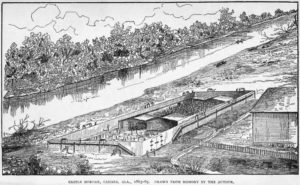In the last 3 articles we've asked the questions Why, Who, and What in regard to remembering the Sultana. In this post, I'd like to offer the following thoughts about When we should remember the Sultana.
In just under three hours from the time of this writing, April 27 at about 2:00 a.m. will mark the 153rd anniversary of the Sultana disaster. Anniversaries are natural times to remember historic events and this one will be no different for those of us who often recall the story of the tragedy. It will be especially poignant for a number of folks who belong to the Association of Sultana Descendants and Friends. Tomorrow evening, approximately 100 members of the group will convene in Selma, Alabama to begin a two-day, annual commemoration of the worst maritime disaster in U.S. history.
Part of their activities will include visiting the site of Cahaba Prison, also known as Castle Morgan, where some of their ancestors were held as prisoners of war. Although the prison structure no longer exists, the outline of its foundation can still be seen. Being confined inside a space that's not as wide as a football field and only two-thirds as long that held 3,000 men is a sobering and thought-provoking experience. Shortly before their release from prison and trip to Vicksburg to board the Sultana, the nearby Alabama River flooded, forcing the prisoners to endure four days and nights standing waist-deep in freezing water.
The key to answering the question of when to remember the Sultana lies in not making the subject a once-a-year event. For those who are descendants of someone who was on board the boat, remembering happens often and for a variety of reasons. Although it's not pleasant for them to remember, it is easier for them to not forget due to closer ties. For those of us whose family trees don't contain a person directly connected to the disaster, remembering may be a bit more difficult. In my own case, discovery of the Sultana story resulted in a fourteen-year quest to produce, alongside my brother, a documentary that would tell the story factually while honoring the victims as well as their descendants. Seldom a day goes by that I don't think of the tragedy.
It all comes down to this: Remembering someone or something is an act of the will. If enough importance is placed on the person and/or event, remembering becomes part of a lifestyle. Regardless of how many times over the course of a day or year it happens, if we remember and teach our loved ones and others to do the same, then those we are remembering are never forgotten. They live on in our memories and in the minds and hearts of those to come.
Next time, we'll try to answer the question, "Where do we remember the Sultana"? Thanks for reading!



No comments yet. You should be kind and add one!
The comments are closed.